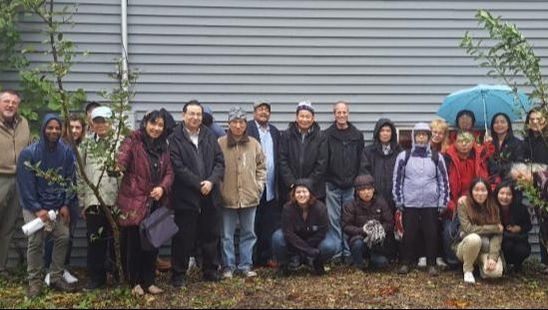Through these projects, the network has increased the capacity of its members, strengthened its relationship with the City of Chicago, gained experience in collaborative programming, and outreached to over 5000 Chicago residents about sustainability.
Smart Grid Energy Education With a proposal written in 2014 and a project launch in 2015 Preparing for Rainy Days: Culturally-Inspired Smart Grid Education in 3 Communities, supported by the Illinois Science and Energy Innovation Foundation, was the first funded collaborative CSLN project. Over the two years, seven CSLN member organizations worked together to deliver Smart Grid and energy education messaging to community members in four different communities and identify salient values and messages to connect energy to residents' everyday lives. ICA staff trained the CSLN partners in image shift methodology. Each partner designed a community image shift from passive energy user to active energy consumer, and their community-specific messages aimed to support the image of an active energy consumer. A detailed account of the community-specific messages, lessons learned, and tools to replicate aspects of the project can be found in the final project toolkit. For CSLN members, the most notable component of this project was the cultural approach. Partners used their existing organizational and community assets to develop energy education programming that spoke to the values of community members. Moving forward, this experience gives context for how the CSLN can seek out future funding for collaborative projects. Collaborative Partnership around Recycling The CSLN policy team, which had had many round table discussions with the Chief Sustainability Officer of the City of Chicago, landed a tangible collaborative project with the City in 2016. One of the goals of the CSLN policy team is to create more bi-directional communication between local grassroots organizers and policy makers at the city level. The City’s Chief Sustainability Officer, Chris Wheat, asked the CSLN to get local sustainability leaders and resident voice into ways to improve Chicago’s Recycling Programs. CSLN hosted four separate recycling meetings. The first meeting featured a consensus workshop to create a framework of possible solutions to the blocks people were currently facing; the subsequent three meetings held on the City's North, South and West sides reviewed the framework and added additional suggestions for improvement. The CSLN policy team compiled the residents’ solutions and discussed the results with City officials. The report focused on eight major barriers to recycling and six arenas with possible solutions. A draft of the document can be found here. Currently, per the City’s request, residents and local sustainability leaders are being asked to prioritize one of the six arenas, and which specific action items might be most helpful. Network members and recycling enthusiasts eagerly anticipate how the City will take action on their recommendations. Moving forward, this project provides a concrete example about how the CSLN and participatory community engagement methods can benefit policy, making a case for future collaborations with the local policy makers. These two projects represent substantial collaborative work. Network members look forward to strengthening the network in 2017 through continued policy work, collaborative projects, and nurturing the vibrant and supportive community within the network. Comments are closed.
|
|
4750 N Sheridan Rd, Chicago, IL 60640
773 769 6363 x 335 |
Copyright 2022. The Institute of Cultural Affairs. All rights reserved.

